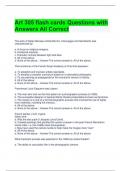Exam (elaborations)
Art 305 flash cards Questions with Answers All Correct
- Course
- Institution
Art 305 flash cards Questions with Answers All Correct The work of Italian Baroque artists Bernini, Caravaggio and Gentileschi was characterized by: a. A focus on religious imagery. b. Emotional intensity. c. Dramatic contrast between light and dark. d. All of the above. e. None of the ...
[Show more]



